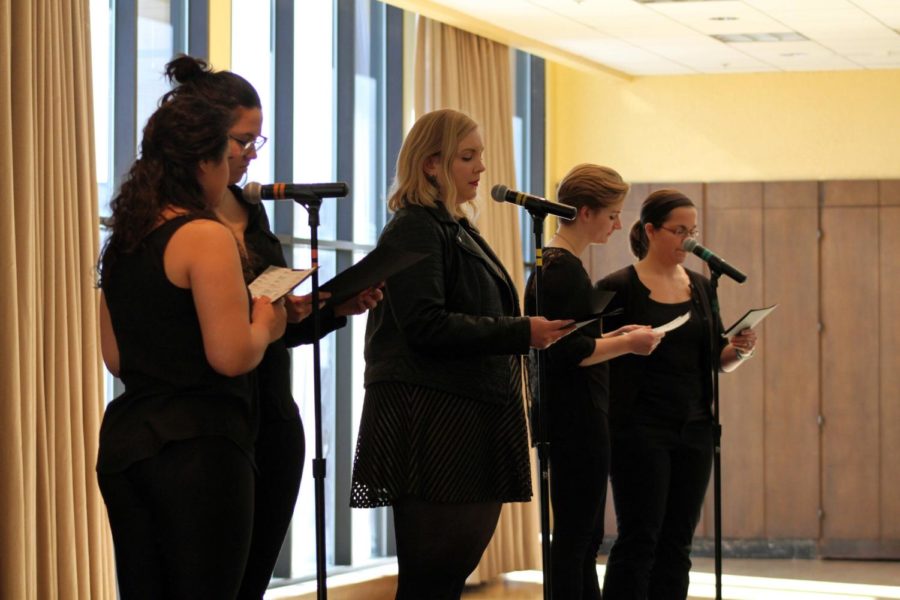What is “The Vagina Monologues?”
Hannah Olson / Iowa State Daily
Performers talk about the experience of transgender women during the Vagina monologues in the Sun Room of the Memorial Union on Feb. 12.
November 28, 2017
“When you rape, beat, maim, mutilate, burn, bury and terrorize women, you destroy the essential life energy on the planet.”
This is a quote from “The Vagina Monologues.”
“The Vagina Monologues” is a play written by Eve Ensler. Ensler is a Tony Award winning playwright, performer and activist.
“The Vagina Monologues” dive into consensual and non-consensual sexual experiences. It also covers topics such as body image, genital mutilation and reproduction. This is done through personal monologues performed by women of various ages, races and sexualities.
The monologues were made up from interviews done by Eve Ensler with more than 200 women. The interviews began as conversations with her friends and they would recommend her to other women to talk about these issues.
In an interview on women.com, when asked why she became impassioned by vaginas instead of breasts or giving birth, she stated she was drawn to vaginas because of her own personal history and “because of sexuality, because women’s empowerment is deeply connected to their sexuality.”
In this interview, she also discusses the issue that women were reluctant to talk in the beginning.
“No one’s ever given them the opportunity to talk. Any time we open the door to a place where we have a lot of feelings or thoughts or stories, we react enthusiastically,” Ensler said. “The story of your vagina is the story of your life, and women want to talk about their lives.”
The first draft was written in 1995.
Originally, Ensler performed every monologue herself, with following performances featuring three other actresses. More recently, there is a different actress for every role.
Since it opened at the HERE Arts Center in New York City on October 3, 1996, it has been ever changing. In 2004, the first all-transgender performance premiered.
Some of the monologues include, “I Was Twelve,” “My Mother Slapped Me” and “My Angry Vagina,” a piece about young women and girls’ first menstrual period.
Another was “The Women Who Loved to Make Vaginas Happy,” about a sex worker who discusses the details of her career and her love for giving women pleasure.
Every year, a new monologue is added to highlight a current issue affecting women around the world. In 2004, Ensler added a monologue titled “They Beat the Girl Out of My Boy….. Or So They Tried,” after interviewing a group of women whose gender identity differed from their assigned gender at birth.
After gaining momentum, “The Vagina Monologues” sparked the V-Day movement. The V-Day movement is a global activist movement to end violence against women and girls. It is described as a “catalyst that promotes creative events to increase awareness, raise money, and revitalize the spirit of existing anti-violence organizations.”
After a few years, a college initiative followed to encourage college and university students to perform “The Vagina Monologues” on or near Valentine’s Day to raise money and to make violence against women visible.
At Iowa State, the Margaret Sloss Women’s Center, Student Union Board and the Society for the Advancement of Gender Equity, host “The Vagina Monologues” to raise awareness and funds for anti-violence groups within Ames. All of the benefits go to the Assault Care Center Extending Shelter and Support.
Last year, the performance donated $5,266.19 to ACCESS.
“The Vagina Monologues” were brought to Iowa State in 2001 by Alissa Stoehr, a student.
Over the years, “The Vagina Monologues” have received criticism from feminists and social conservatives for being anti-transgender and colonial.
A feminist, Betty Dodson, criticized the play for the lack of the term “clitoris” throughout the play. She believes the play sends messages that the vagina is the main sex organ, not the clitoris. Members of the transgender community have also criticized it for being insufficiently inclusive of transgender people.
The Margaret Sloss Women’s Center posted a response to the critiques. In this response they state “we also encourage you to critically reflect and think about the issues raised in ‘The Vagina Monologues’ production, the voices heard, and the voices not heard in Eve Ensler’s script.”
They continue to say one of the conditions of getting the rights to the play is that you cannot alter it.
They also address some of the critiques “The Vagina Monologues” have received in the past. This includes the representation of prostitution in “The Women Who Loved to Make Vaginas Happy,” as a pleasurable experience, the stereotyping of particular identity groups by their “moans” and the issue of inclusivity to women who do not have vaginas.
Iowa State will present the Vagina Monologues Thursday, Feb. 15 at 6 p.m. and 9 p.m., and Friday, Feb. 16 at 7 p.m. in the Sun Room in the Memorial Union.
















